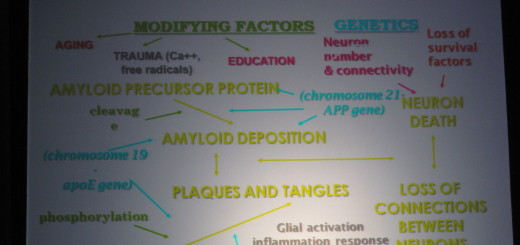How can we manage difficult Alzheimer’s behaviors?
Following a morning packed with information about research, the afternoon session of the Alzheimer’s Association education conference in Petaluma featured a panel discussion with four individuals who are currently caring for a loved one with Alzheimer’s disease. Kris cares for a friend at home, Elly cares for her husband at home, Dan cares for his wife in an assisted living facility and Roger cares for his mother who lives in an independent living community. The caregivers told a bit about their stories and took questions from the audience.
The next session featured Cynthia Barton, RN, MSN and Jennifer Merrilees, RN, PhD, who talked about Understanding and Managing Behaviors in Dementia. This was a very popular session as a majority of family and professional caregivers struggle with difficult behavioral problems in people with Alzheimer’s.
First, they explained some of the cognitive changes in dementia and the behaviors they may cause. Memory loss can contribute to repetitive questions; loss of executive functioning can lead to difficulty completing tasks; loss of visual-spatial skills leads to problems getting dressed and loss of language can lead to problems with naming objects.
Some of the most common behavioral symptoms with Alzheimer’s disease include apathy/indifference (75%), aberrant motor behavior (inability to sit still, 57%), irritability (55%), eating disorders (54%) and agitation/aggression (52%).
They offered a few guiding principles in managing behavior symptoms of dementia, including:
· Behaviors are NOT intentional, but they are meaningful
· Keep the goal in mind
· Is the behavior a problem?
· Know level/areas of impairment
· Unable to respond to logic
· Routine = comfort
They also reviewed a framework for behavioral assessment:
· Step 1: What happened before the behavior?
· Step 2: What is the behavior you observed?
· Step 3: What are the consequences?
· Step 4: What do you and the person with dementia do in response?
They then offered a few strategies for dealing with some common problems and reinforced that challenging behaviors are part of the disease, just as memory loss is.
“Success may be about accepting rather than trying to change things,” they said. “Remember: you are doing the best you can!”
Lastly, conference attendees were treated to a performance by writer/actor Nicole Maxali, who delivered her solo performance of I Heart Lola, about her experience with a grandmother with Alzheimer’s. Learn more about Nicole and I Heart Lola here: http://www.nicolemaxali.com/ and view Nicole talking about her Lola in this video:


















As caregivers, we understand how difficult it can be to care for someone with Alzheimer’s. These are great tips to keep in mind!
Thanks for sharing this information. These are important tips to keep in mind when dealing with clients who have Alzheimer’s or other dementias. While each day is different, our caregivers are trained to use techniques such as giving simple choices and redirecting.
Cathy Murphy, Home Instead Senior Care in San Francisco
I have a grandma with this disease & she acts up a lot . she crys almost everyday. i need halp . please give me some advice.
To share my real good thoughts to the cleints has Dementia, “Alzhiemer’s” in my own honest opinion, Is to help and always supervised to observed on what was happenings their behavior.. Now, my testimony, I been searched in my own knowledge, that Dementia, to Alzhiemers is cause of earlier Depression from their childhood.. Or related from their Genes.. My husband has diagnosed of Dementia last 2008. before his early retirement from “BLM” Burueau Of Land management. accordingly his behavior he always stressed, since we’re been a friends, He is very remarkable person. as a friend of me. We’re been long time friends of 15 years.. But, my observation, his behavior suddenly he was stressed all the time, and irritable. But I was there with him all the time.. Until, It was interesting in my career as an Medical Assistant’ I was eager to understand to cope his stranged behavior. Until, I give all my support as of my positve spiritual support. I’ll understand.. Because he was really nice person, silly and funny.. But, I was wondered why! all of the sudden he was awful strange to me. He get mad fast. and after he told me sorry!. and the year passed by, all my understanding, my wisdom is all with him. But this is my question, is just because, I think he has Baby Boomer, or Autism, or Bipolar.. or just because, he was Alcoholic. since he was young. and their family has all has a problems. I believed that is heridetary and from their genes. Because his Dad has Brain Tumor cancer of teh brain, and his sister has “MS”. and his Mom has breast Cancer. So, now. I’m the one who taking care with him. since I pulled out him from Assisted Living. Because they have problems for his Infection, and I am not satisfied for their Nursing Care..And thank you very much.
For all I want, in the future, I hope that all Doctor’s of Scientist, hoping that someday, we will help the health of each one has diagnosed of “Dementia”. The better processed, Is in my clued, is in my Knowledged to aware of Dementia, for all of us, must have caring, attention, patience, spiritual support. even though for acute dementia, but, my techniques approach! Is my secrets is to cuddle them, acting like we are baby to, and offer the things, until they’re satisfied..For me, I have mission from God. is in my dreams to help people are sick! Lord told me, U sit them to all the people are sick! talk to them, and cuddle them. And it will helps in human life. To show our LTC. our my supports, I love being parts of people has “Alzhiemers”. or any parts of our Illnesses or parts of problem. As long as we need our helps.. Thank you. God blessed
Awesome! Extremely absorbing article. I am book-marking the particular web page right now. Thanks a bunch!
What is better? Alzheimer assisted care or memory assisted care? What is the difference and is there a difference in cost? What can one expect to pay? I live in CA.